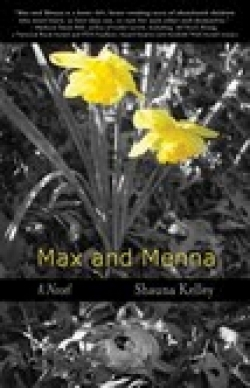
Max and Menna
A Novel
- 2010 INDIES Finalist
- Finalist, Young Adult Fiction (Children's)
In his excellent book How Fiction Works, critic James Wood says, “The ideal of writing is a procession of strung details, a necklace of noticings.” He distinguishes between the real world—what the writer sees—and the noticed world—what the writer wants the reader to see. The details a writer chooses to include in a work are critical to defining tone and theme, and, with practice, can act as a fingerprint for the writer. Max and Menna, the first novel from young writer Shauna Kelley, has a fingerprint of its own, as bright and clear as a new crocus in the snow.
Forty-five miles west of Mobile, Alabama, the fatherless twins Max and Menna depend mostly on each other. Their older sister, Lily, has troubles of her own. Their mother, a caricature of an alcoholic, is unable to support their family. Their town is populated by common types: friendly black folks, emotionally mysterious Indians, privileged white boys who thrive on violence and hate, town gossips. It’s a world easily defined in terms of good and evil, and the reader has no trouble knowing who she’s supposed to root for. Max and Menna meet Nick, a local Native American boy close to their age and he becomes the third point of their triangle. In terms of logic, it’s a smart choice—Kelley can play with themes of race, budding love, and coming-of-age trials. But, at the same time, the novel is a little too clearly mapped out. The villains, for example, are too hateful; they rape, cuss, batter women, attack people of color, and are untouched by the law. But if the bad guys are written with a heavy hand, there is a delightful ambiguity in the main characters. Hot-tempered, passionate and thoughtful, Menna especially shines in this novel. In a work stuffed with set pieces, Menna is the one with the kiss of life on her, and Max and Menna revolves around the sections written from the perspective of the female twin.
Interestingly, Kelley wrote the first draft of a shorter version of the book while in high school. Much of the freshness of that early writing is still present—in the dialogue, in the novel’s quick pace, and delight in emotional drama. Characters rush—never walk—towards each other. While the reader is never truly in doubt of the outcome, she is always in suspense. The dialogue, particularly in scenes between Menna and Nick, sparkles. Kelley has managed to keep a young, idealistic (and sometimes anxious) tone in her characters’ voices, which saves Max and Menna from seeming old hat. As a first novel, Max and Menna is very fine. As James Wood says, “Our memories are aesthetically untalented.” But Kelley shows, with ease, that the freshness of those early days playing in the woods can be reclaimed at any time—that we can relive, through her characters, the big-hearted hopes and dreams we all once had, a long time ago.
Reviewed by
Claire Rudy Foster
Disclosure: This article is not an endorsement, but a review. The publisher of this book provided free copies of the book and paid a small fee to have their book reviewed by a professional reviewer. Foreword Reviews and Clarion Reviews make no guarantee that the publisher will receive a positive review. Foreword Magazine, Inc. is disclosing this in accordance with the Federal Trade Commission’s 16 CFR, Part 255.
